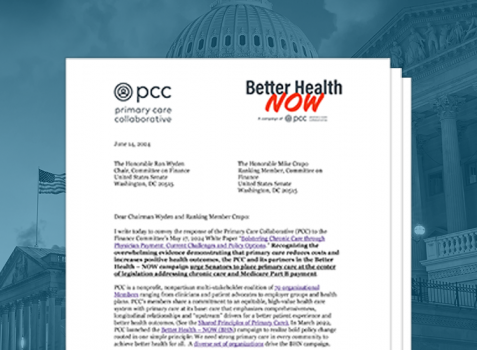You are looking at an archived version of our site. Please visit thepcc.org for a fresh, new experience!
You are here: Array » Primary Care Must be a ...
Primary Care Must be at the Center of Medicare Payment Reform
Today, under the leadership of United States Senate Committee on Finance Chair Senator Ron Wyden and Senator Mike Crapo, lawmakers in Washington are considering sweeping changes to how Medicare pays for chronic care and for Part B benefits.
These conversations are an important first step in shifting from a convoluted, ineffective sick care system to one focused on promoting better health, and the Primary Care Collaborative is grateful to the Senators -- and their lead staffers Marisa Salemme and Conor Sheehey -- for their efforts to find a bipartisan solution to major challenges facing the American health care system.
But as lawmakers weigh these important changes, it’s essential they place primary care at the center of their efforts. Primary care is the only area of health care where stronger investment can both reduce costs and improve outcomes for patients.
Late last week, in a response to a Senate Finance Committee RFI on chronic care, the Primary Care Collaborative (PCC) emphasized primary care’s central role in curbing chronic conditions and provided concrete policy solutions to strengthen primary care.
In its response, the PCC noted that, "High-quality, comprehensive primary care is an essential component that must be part of any national strategy to address chronic physical and mental health conditions and the constant, unaffordable costs they generate."
PCC also emphasized the important role of hybrid payments in bolstering primary care – an approach that would empower primary care clinicians to build the teams they need to deliver higher quality care to patients, provided they are built with the following 6 principles in mind:
- Allow for cost-sharing waivers to apply to primary care services reimbursed through a population-based hybrid payment
- Allow for payment adjustments that account for clinical and social risk, in order to support primary care teams made up of different types of clinicians
- Tier the value of payment based on the scope of services provided
- Make a higher tier payment available to clinicians that integrate behavioral health and social care
- Incorporate sufficient support to increase behavioral health referrals and screening for SDOH
- Create an accountability framework that supports quality improvement
In the coming weeks, PCC and our Better Health –NOW partners look forward to working with Members of Congress on both sides of the Capitol and in both parties to place primary care where it should be at the very center—of our health care system.
Recent News
August 16, 2024
August 12, 2024
July 16, 2024
May webinar highlights: “The Commercial Market: Alternative Payment Models for Primary Care” Nate Murray explains w… https://t.co/KX9Wi2w6oY —
2 years 6 months ago
@CMSinnovates’ primary care strategy is rooted in a 2021 @theNASEM’s report which called #primarycare “foundational… https://t.co/glbPxvCysg —
2 years 6 months ago
@CMSinnovates has a new #primarycare strategy, envisioning “ACO-based primary care model tests that may focus on pr… https://t.co/aJGF1z411l —
2 years 6 months ago
- Page 1
- ››
Secondary menu
Copyright © 2024 Primary Care Collaborative





